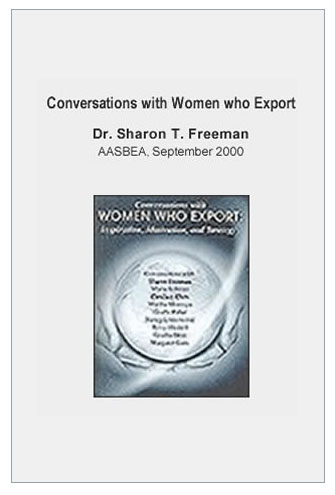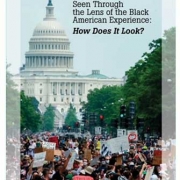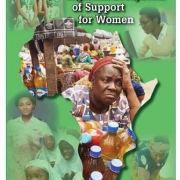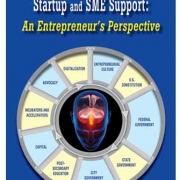Conversations with Women who Export
by Dr. Sharon T. Freeman (Paperback)
This book provides real world examples of successful women and minority female firm owners who are pioneer exporters. It tells their life stories and share their insights about how to travel roads less traveled in business and in the global marketplace.
AASBEA, September 2000
Sharon Freeman, Ph.D., the author of Conversations with Women Who Export is an exporter of consulting services who wins the prize for the most improbable entry into the world of international business by establishing her first business in Hong Kong in the mid-1980s. Since then, she has blazed more trails in the world of international consulting than perhaps any other African American woman, having worked in over one hundred countries to date. Her story is an inspiration to all of the African American women-owned small businesses, showing that all things are possible with the proper preparation, dedication, and belief in oneself. Dr. Freeman is the Chair of the DC Chamber of Commerce’s International Committee; Vice Chair of the U.S. Department of Commerce’s Industry Sector Advisory Committee; member of the U.S. Department of Commerce’s Industry Functional Advisory Committee on E-Commerce; and member of the National Press Club’s Forums Committee.
Maria de Lourdes Sobrino, an exporter and manufacturer of gelatin, breaks the “mold” in many ways. She shows us that a first-generation Mexican can come to this country as an immigrant from an upper middle-class family in Mexico without having any friends and family in business and start a manufacturing business from scratch. She also shows us what happens when a dormant and innate entrepreneurial spirit is unharnessed. Once Maria connected with her entrepreneurial spirit, she was able to grow her business into a $10 million enterprise. Tragedies such as the breakup of her marriage and the breakup with her business partner never daunted her spirits, she continues to face each day with anticipation and excitement and she continues to create new global pathways in business.
Candace Chen is an exporter of an innovative, patented invention that improves the efficiency of engines. She shows us how going global can help to improve one’s domestic market. She demonstrates how a young Chinese American woman who went to law school and never intended to become an exporter can nevertheless succeed in the global marketplace with the right planning, business tactics, and strategies. All of this, you will see, Candance accomplished with a strong sense of moral and professional ethics to guide her. She further lifts our spirits by showing us that siblings can work together and support each other.
Martha Montoya is an exporter of a syndicated cartoon strip. Her notoriety comes from dreaming such an impossible dream in the first place: that of being a cartoonist when she could not even draw! She also has taken the most circuitous route to her present business, coming all the way from Colombia and working in many different capacities before succeeding in the American market and subsequently in global markets. She also shows us that dreams really do come true-and when they do, they really pay off.
Gisele Rufer is a manufacturer and exporter of Swiss-made women’s watches. She no doubt traveled the furthest distance to break the glass ceiling in the male-dominant watch industry in Switzerland. Gisele is still based in Switzerland, but her story shows us how women’s issues in business are the same the world over. The only way to be successful in a nontraditional business, she demonstrates, is to think outside the box and to put your money where your mouth is and stay the course.
Nancy Underwood is an exporter of environmental services. She clearly spent the most time in the classroom to acquire the skills and certifications that are necessary to break way from the pack. An African American woman, she is a shining example of pulling oneself up by the bootstraps–in her case from welfare to the global marketplace. When life dealt her lemons she made lemonade, in part from the recipes she got from her advisors and mentors. Her story underscores the importance of networking, researching, and preparing to go global.
Betsy Haskell is the owner of a hotel in the Republic of Georgia. She is considered a U.S. exporter because she is an American who causes exports to happen. In her case, she actually imports American goods for her hotel into the Republic of Georgia. The author met her on a recent trip to Georgia and interviewed her while there. Many people in the United States know about Betsy, whose fame precedes her because of her bold move to set up a hotel in the Republic of Georgia when the country first declared its independence from the Soviet Union. She clearly wins the prize for doing the most far-out thing-especially since she had never owned her own business, nor did she have any prior hotel experience. Hers is yet another example of the triumph of the spirit.
Geetha Devi is a new exporter of software solutions. She is currently based in Bangalore, India, where her flagship business is manufacturing and selling lawnmowers in the domestic Indian market. Her journey into the world of exporting was also a long and circuitous route and shows us about the power of possibility thinking and about the power of preparation and having a positive and global attitude. She admonishes us to prepare ourselves personally and professionally, not only for going global, but also for being global in our approach to life.
Margaret Gatti is an international trade lawyer whose law practice counsels firms on how to go global. She provides invaluable advice about how to prepare for going global and shares her experience as both an importer and exporter prior to establishing her law practice and insights from her law practice about how to go global the right way.



























